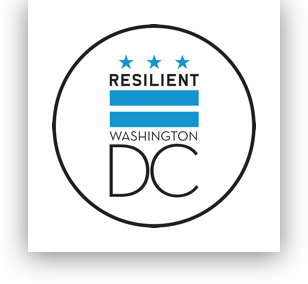Mayor Bowser established the Resilient DC initiative to build DC’s resilience to both catastrophic shocks and chronic stresses in order to ensure that DC thrives in the face of change. This includes the ability to withstand any natural or man-made challenges that threaten our communities and tackle the social challenges that come with being a fast-growing city.
In 2016, Washington, DC was selected from more than 1,000 cities around the world to become part of the 100 Resilient Cities (100RC) network, along with cities like Paris, New York, Bangkok, and Buenos Aires. As part of the 100RC network, the city received technical and financial support to develop and implement a resilience strategy for handling natural and manmade challenges. This strategy is the result of a nearly two-year process of shared discovery that resulted in a deeper, cross-sector understanding of some of DC’s most important challenges. In total, more than 100 community leaders and subject matter experts contributed, in addition to the 1,100 residents, from all eight wards, who shared their ideas for building resilience.
Implementation
The goals, objectives, initiatives, and focus areas of this strategy are informed by past efforts, analysis of current conditions, and input from stakeholders across the city. Successful implementation of this strategy must be shared by government agencies, businesses, nonprofit organizations, and residents as building resilience requires sustained, coordinated action from inside and outside of government.
The Office of the City Administrator, in close coordination with the Executive Office of the Mayor, will manage implementation of this strategy. The Chief Resilience Officer, reporting to the City Administrator, will serve as a project manager and convener to overcome barriers to implementation, connect people and resources, track progress, and mitigate risks.
Resilient DC is divided into goals, objectives, initiatives, and focus areas.
- 2 focus areas that are either flagship initiatives to showcase resilience or address issues fundamental to building resilience
- 4 goals that set generational ambition to thrive in the face of expected change
- 16 objectives that outline the work necessary to meet each of the goals
- 68 initiatives that are specific, coordinated efforts and commitments to adapt to and leverage change


